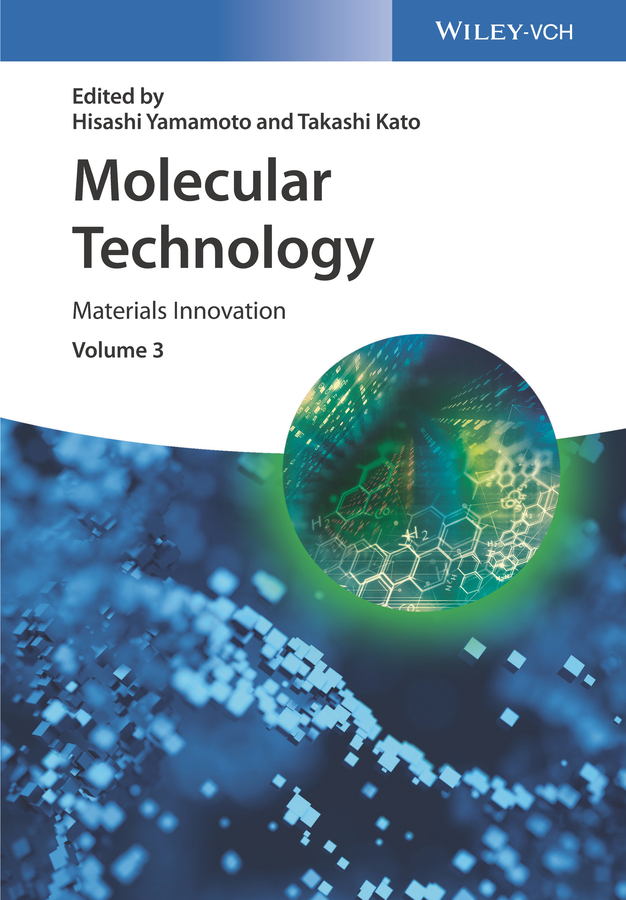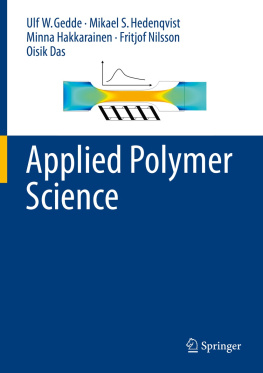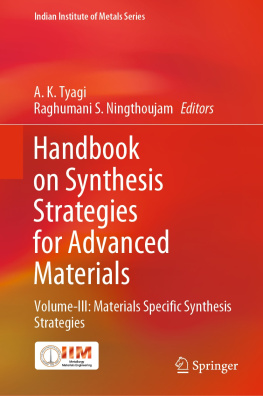
Table of Contents
List of Tables
- Chapter 3
- Chapter 9
List of Illustrations
- Chapter 1
- Chapter 2
- Chapter 3
- Chapter 4
- Chapter 5
- Chapter 6
- Chapter 7
- Chapter 8
- Chapter 9
- Chapter 10
- Chapter 11
- Chapter 12
Guide
Pages
Related Titles
Yamamoto, H., Kato, T. (eds.)
Molecular Technology
Volume 1: Energy Innovation
2018
ISBN: 978-3-527-34163-4
Yamamoto, H., Kato, T. (eds.)
Molecular Technology
Volume 2: Life Innovation
2018
ISBN: 978-3-527-34162-7
Yamamoto, H., Kato, T. (eds.)
Molecular Technology
Volume 4: Synthesis Innovation
2019
ISBN: 978-3-527-34588-5
Molecular Technology
Materials Innovation
Edited by Hisashi Yamamoto and Takashi Kato
Volume 3

Copyright
Editors
Hisashi Yamamoto
Chubu University
Molecular Catalyst Research Center
1200 Matsumoto
Kasugai
487501 Aichi
Japan
Takashi Kato
University of Tokyo
Department of Chemistry and Biotechnology
731 Hongo, Bunkyoku
1138656 Tokyo
Japan
Cover
fotolia_VAlex and fotolia_monsitj
All books published by WileyVCH are carefully produced. Nevertheless, authors, editors, and publisher do not warrant the information contained in these books, including this book, to be free of errors. Readers are advised to keep in mind that statements, data, illustrations, procedural details or other items may inadvertently be inaccurate.
Library of Congress Card No.:
applied for
British Library CataloguinginPublication Data
A catalogue record for this book is available from the British Library.
Bibliographic information published by the Deutsche Nationalbibliothek
The Deutsche Nationalbibliothek lists this publication in the Deutsche Nationalbibliografie; detailed bibliographic data are available on the Internet at .
2019 WileyVCH Verlag GmbH & Co. KGaA, Boschstr. 12, 69469 Weinheim, Germany
All rights reserved (including those of translation into other languages). No part of this book may be reproduced in any form by photoprinting, microfilm, or any other means nor transmitted or translated into a machine language without written permission from the publishers. Registered names, trademarks, etc. used in this book, even when not specifically marked as such, are not to be considered unprotected by law.
Print ISBN:9783527341610
ePDF ISBN:9783527802739
ePub ISBN:9783527802722
Cover Design AdamDesign, Weinheim, Germany
Foreword by Dr. Hamaguchi
Molecular Technology is a newly developed research field supported through Japan Science and Technology Agency ( JST ) research funding programs. These programs aim to establish an innovative research field that harnesses the characteristics of molecules to enable new scientific and commercial applications. It is our great pleasure to publish this book, with the ambition that it will develop both an understanding of and further support for this new research field within the research and student community.
Molecular Technology as introduced in this book began in 2012 as a research area within JST's Strategic Basic Research Programs. JST is an advanced networkbased research institution that promotes stateoftheart R&D projects and leads the way in the cocreation of future innovation in tandem with wider society. JST develops a wide range of funding programs related to the promotion of scientific and technological innovation, which include strategy planning, targetdriven basic research, and promotion of research and development.
Various research projects focused on Molecular Technology are currently underway within JST's Strategic Basic Research Programs, including
- the teambased research program CREST ( Core Research for Evolutionary Science and Technology ) and
- the individual research program PRESTO ( Precursory Research for Embryonic Science and Technology ).
Dr. Yamamoto (CREST) and Dr. Kato (PRESTO) manage the Molecular Technology research area as research supervisors.
In addition, JST's Strategic International Collaborative Research Program promotes research projects in the area of Molecular Technology, including ongoing cooperation with L'Agence nationale de la recherche (The French National Research Agency, ANR).
A wide range of researchers from the young to seniors across fields from green science, life science, and energy are participating in successful research aimed at establishing the new field of Molecular Technology. They are already producing excellent research results and it is our hope that these will develop into technologies capable of initiating a new era in energy and green and life sciences.
I encourage you to read not only researchers in related fields but also look more broadly to researchers working in other fields. Inspired by this book, I look forward to emerging new research fields and seeds toward future innovation.
Michinari Hamaguchi
Japan Science and Technology Agency
President
Foreword by Dr. Noyori
As an affiliated institution of the Japan Science and Technology Agency ( JST ), the Center for Research and Development Strategy ( CRDS ) navigates the latest global trends in science, technology, and innovation to aid the Japanese government in formulating its national strategies. Molecular Technology is the outcome of a research project born of a CRDS Strategic Proposal realized under the excellent editorial supervision of Hisashi Yamamoto and Takashi Kato. To them and to the scientists who have made major advances in molecular technology through their uninhibited research I extend my heartfelt congratulations and respect.
The significance of molecular science in all areas of scientific endeavor is certain to increase. Accurate understanding of molecular assemblies and molecular complexes is essential for comprehending the elaborate workings of natural phenomena and of the genesis and mechanisms of materials and life functions. Now, more than ever, science must be seen as a single entity, a comprehensive whole. Mathematical science and the most advanced technologies of observation and information help us explore the essence of materials and substances in a way that brings together all fields of science. It is the nature of molecular science to continually advance and expand. Using the metaphor of light, we can say that molecules behave in the manner of both waves and particles.
The traditional separation of science into physics, chemistry, and biology no longer applies. Neither does it make any sense to maintain those seemingly selfcontained subdivisions of organic chemistry, inorganic chemistry, physical chemistry, or polymer chemistry. So long as specialized groups and rigid educational systems cling to outdated perceptions, the more important it is to encourage an antidisciplinary type of science in which diverse fields converge rather than conventional interdisciplinary or transdisciplinary attempts to link diverse fields.
Molecular technology, while firmly grounded in fundamental scientific knowledge, aims for practical applications within contemporary society. Johann Wolfgang von Goethe once said, Knowing is not enough; we must apply. Willing is not enough; we must do. Technology with no practical application is meaningless to society. Researchers should not hesitate to set their own themes and topics of exploration in academia where selfdetermination holds strong and creativity wins the highest respect. Researchers must show ingenuity in the pursuit of their chosen mission even as they fulfill their duty to pursue sciencebased technology for society. Never forget that it is by no means advisable to function purely as a support for activities that industry should actually undertake on its own.
Next page







